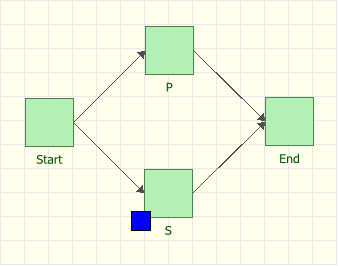BlockSim Example: Default ON unless SCT Overridden: Difference between revisions
Jump to navigation
Jump to search
Dingzhou Cao (talk | contribs) No edit summary |
Dingzhou Cao (talk | contribs) No edit summary |
||
| Line 15: | Line 15: | ||
[[Image:Primary and Standby.png]] | [[Image:Primary and Standby.png]] | ||
Block P is the primary device. It belongs to maintenance group P. | Block P is the primary device. It belongs to maintenance group P. | ||
Block S is the standby device. It has state change triggers. The initial state is OFF. If Block P goes down, then activate this block; if Block P is restored, then deactivate this block. | Block S is the standby device. It has state change triggers. The initial state is OFF. If Block P goes down, then activate this block; if Block P is restored, then deactivate this block. | ||
Both Block P and S have Weibull distribution with Beta=1.5 and Eta=100 for reliability and repair action. <br> | Both Block P and S have Weibull distribution with Beta=1.5 and Eta=100 for reliability and repair action. <br> | ||
==== Block Up/Down plot ==== | |||
Revision as of 15:45, 21 July 2011
Primary and Standby Example
Purposes
The purposes of this example is to illustrate the following options in SCT:
- State Upon Repair: Default ON unless SCT overridden
- Activate a block if any item from these associated maintenance group(s) goes down
- Deactivate a block if any item from these associated maintenance group(s) is restored
Description
Consider a system shown in Figure below:
Block P is the primary device. It belongs to maintenance group P.
Block S is the standby device. It has state change triggers. The initial state is OFF. If Block P goes down, then activate this block; if Block P is restored, then deactivate this block.
Both Block P and S have Weibull distribution with Beta=1.5 and Eta=100 for reliability and repair action.
